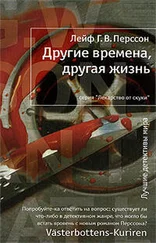First there was the murder of the Yugoslavian ambassador, involving Croatian extremists and separatists, and a dead Serbian ambassador, and in any event, Sweden had no responsibility for all that. Then other Croatian terrorists hijacked an SAS plane to free the murderers of the ambassador, and in the process risked the lives of almost a hundred ordinary Swedes. The plane finally landed in Spain, where the hijackers immediately gave up and turned themselves over to the police. And now: a half-dozen crazy students calling themselves the Socialist Patients’ Collective, who wanted to overthrow German society by force and who chose to do so in Stockholm, of all places. This was not just, and it was un-Swedish with a vengeance. The fact that in between all that a domestic piece of talent from the traditional criminal lumpen proletariat took hostages in a bank on Norrmalmstorg was something they would have to put up with.
First there had been discussions in the prime minister’s office about how the hostages could be rescued without further unnecessary bloodshed. There was more than enough as it was. Ideas were in short supply, but at last the prime minister, who had been a reserve officer in the cavalry, suggested that the police should storm the building. But the idea was immediately dismissed by a unanimous top police command. Swedish police lacked both equipment and training for such missions, despite the fact that, as the national commissioner so alertly took the opportunity to point out, funds for such operations had been requested by the department on several occasions and for several years running, but no money had been granted. Now they had neither equipment nor training, despite apparent willingness.
“It would be a pure suicide mission,” the national commissioner clarified in his rasping dialect, and an even greater gloom settled over those assembled.
When the West German government then gave their reply categorically rejecting the terrorists’ demands, the mood quickly reached a low ebb, and at last, for lack of anything better and because something had to be done, it was agreed that a little tear gas should be fired into the building. While this effort was being planned, however, things resolved themselves of their own accord when the top floor of the embassy building was literally blown into the air. It was unclear why, but that was a question for later that others could answer. Because for the most part those inside the building seemed to have pulled through, there were more important questions on the night’s agenda.
At that point they moved over to the government’s conference room, and the discussions quickly took a new direction. Namely, how they could be rid of the five surviving terrorists as quickly as possible. The very thought of having them in Swedish prisons, with the prospect of constant attempts to free them through new airplane hijackings, kidnappings, and all the other outrages their comrades might conceivably think up, was just about the worst thing that could be imagined.
“They’ve got to go. There’s nothing to discuss,” as one of the older cabinet ministers summarized the matter even before the deliberations had begun.
The only one who raised objections was the advisory cabinet minister in the Ministry of Justice, the government’s own judicial expert, and as it happened the same man who had written the terrorist legislation that would be the basis for the immediate deportation. According to him the problem was not complicated at all. If the government’s intention was to use the terrorist law, then there was no legal basis for deporting the five terrorists, but because this was no time for judicial subtleties a united government, including the legal consultant, decided to immediately deport the five using that very same Swedish terrorist law that actually applied only to foreign citizens and therefore was not even an issue for the Ministry of Justice.
“You can’t have the statute book under your arm in these kinds of situations,” as the cabinet member responsible for “foreigner issues” so elegantly summarized the decision. She was a woman besides, the youngest in the government, the youngest cabinet member ever, and as decisive as male colleagues twice her age.
For her, Friday the twenty-fifth of April was a day filled with practical tasks from early dawn until long past midnight. First she had to try to get a little order in the jurisprudence, to the extent possible, and then clear up a thousand and one practical details in connection with the deportation itself. The Germans, for example, had promised to send over an airplane to bring home their countrymen, but the fact that it never showed up was of minor importance. From the start the Swedish authorities had decided that a Swedish plane would be on standby at Arlanda, fueled and ready, with an eager, rested crew and accompanying nursing personnel.
The medical condition of the deportees was a problem. None of them was in wonderful shape, but for three of them at least the doctors had given the go-ahead, and it was even simpler with the fourth one. He was so severely burned that if the bed he was lying on had been moved a few feet he might as well have been killed on the spot. It would be necessary to wait a week until his condition was stable enough for him to survive the trip home to West Germany. Letting him die en route was not an option. That was the sort of thing that made people want to take revenge. But after a week he was allowed to go home, and once home he had the good taste to spend another week in a German hospital before he died.
It was the fifth one, the female participant in the occupation of the embassy, who represented the major problem, for on her case the opinions among the medical experts were sharply divided. The first doctor asked saw no problem at all in proceeding with her deportation, but when the cabinet minister responsible, a large number of police officers, and the necessary nursing personnel went to the hospital to pick her up, the senior physician responsible started to dig in his heels. Finally he played his trump card and simply refused to discharge her. If she were to be taken away, someone else would have to take the medical responsibility, and he wanted an affidavit from the cabinet minister attesting that he was opposed to the transport.
If it was his patient’s well-being he had in mind, this was not very smart of the doctor — it suggested a significant underestimation of his opponent, for in a situation like this you do not win any victories if you go around with a statute book under your arm. Without changing her expression, the cabinet minister took out a pen and wrote out the order for deportation. Then she wrote a brief affidavit for the doctor, and she and her entourage took his patient to Arlanda. Immediately after three a.m. on Saturday the government transport plane finally lifted off toward its secret destination in West Germany with its cargo of four German terrorists.
What had happened was definitely not a cheerful story, but in the general misery the government could be happy that public opinion was united behind them. In addition, for once the goodwill was shared by the populace and the media. The man on the street was, to put it simply, furious. The whole thing was very un-Swedish, and at the same time it was typical for the Germans to foist their problems on their peaceful neighbors — something the Germans unfortunately had been in the habit of doing for far too long. In brief, you got the terrorism you deserved, and besides, everyone who had been abroad in winter knew that the Germans always push ahead in the lift lines at the most popular ski resorts, despite the fact that these were in Austria and Switzerland.
In the media various editorial writers and so-called experts were feasting on the shortcomings of the German government. Not only had the German government avoided taking any responsibility; it even had the gall to shift the responsibility onto the Swedish government, the Swedish police, and the Swedish people. In addition, to be on the safe side they were so completely and utterly incompetent that the only reasonable conclusion was that the German embassy in some mysterious way must have self-ignited, and that the terrorists’ contribution to the matter was to be seen more as an effect than a cause.
Читать дальше












